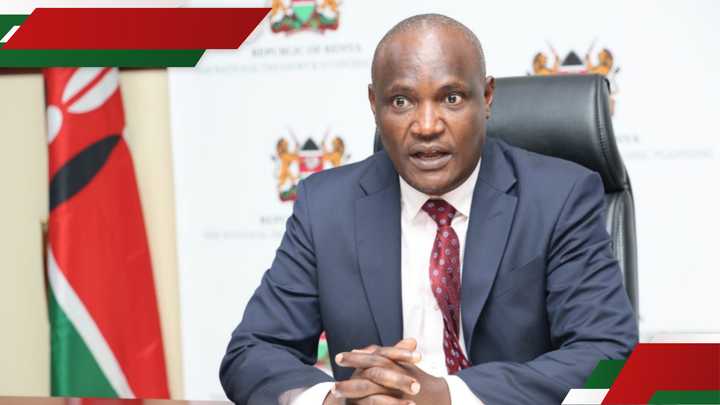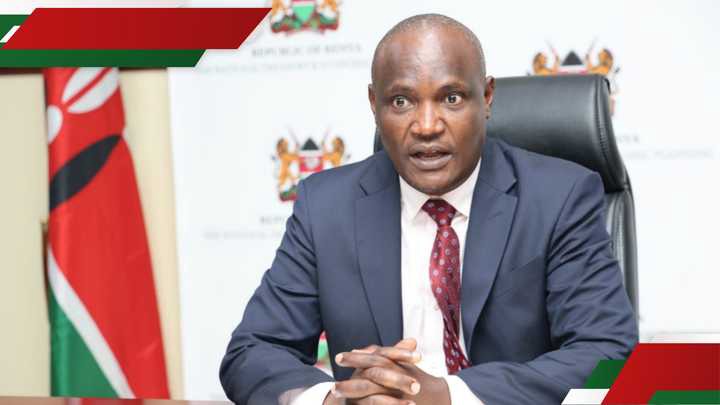- The National Assembly invited views from Kenyans and individual business owners on the Finance Bill 2025 proposals
- Treasury Cabinet Secretary (CS) John Mbadi described the Bill as a people-friendly revenue-raising measure that does not introduce any new taxes
- Mbadi clarified the proposals during a public participation forum dubbed Youth Parliament Kenya, organised by digital publishers including TUKO.co.ke
Search option is now available at TUKO! Feel free to search the content on topics/people you enjoy reading about in the top right corner 😉
Wycliffe Musalia has over six years of experience in financial, business, technology, climate, and health reporting, providing deep insights into Kenyan and global economic trends. He currently works as a business editor at TUKO.co.ke.
Nairobi, Kenya – Kenyans have kicked off the process of reading and analysing the Finance Bill 2025.

The National Assembly invited views from the public and individual business owners on the new Bill, which was presented to parliament by Treasury Cabinet Secretary John Mbadi.
Will Finance Bill 2025 rais taxes?
CS Mbadi referred to the new revenue-raising measures as a people-friendly policy that does not introduce new taxes.
PAY ATTENTION:TUKO is in WhatsApp Channels now! Subscribe and read news in favourite messenger.
Affirming this during a public participation forum dubbed Youth Parliament Kenya, organised by digital publishers including TUKO.co.ke on Friday, May 16, in Nairobi, Mbadi said the government has shifted its focus to enhancing efficiency and sealing revenue leakages instead of burdening citizens with higher levies.
“Borrowing from what happened last year and our national tax policy, we noticed that Kenyans do not need higher taxes and we need a predictive tax regime… That’s what informed this year’s bill. That is the bottom line,” said Mbadi.
Mbadi noted that the Finance Bill 2025 significantly departs from last year’s fiscal proposals, which drew widespread criticism for raising the cost of living amid economic hardship.
What’s new in Finance Bill 2025?
The CS explained that the new approach draws lessons from past mistakes and aligns with Kenya’s Medium-Term Debt Strategy and National Tax Policy, which emphasise predictability, stability, and sustainable fiscal management.
“We are taking a conscious decision to streamline the tax system, not to complicate it,” he said.
CS Mbadi highleted the following policy changes that will be beneficial to taxpayers:
Targeting Tax Expenditures
He said the Bill proposes a review of tax expenditures — including exemptions and zero-rated items — which he noted have become channels for tax leakage.
“Some of these exemptions don’t serve their intended purpose. We are simply allowing revenue loss, and the cost is ultimately borne by honest Kenyans,” said Mbadi.
The bill proposed to reduce the number of zero-rated goods and instead classify them as tax-exempt to tighten compliance and reduce revenue losses through tax refunds.

Relief for Retirees and Digital Economy
The Finance Bill 2025 proposed a tax-free pension and gratuity payments for retirees, safeguarding retirement benefits from taxation at the point of exit.
Additionally, digital entrepreneurs and online service providers stand to benefit from a reduction in the Digital Service Tax, which will be cut from 3% to 1.5%.
This is seen as a recognition of the sector’s growing role in the economy and an attempt to encourage formalisation and compliance without stifling innovation.
Improving Tax Visibility
CS Mbadi said the government is also investing in digitising tax administration, with plans to modernise the Kenya Revenue Authority (KRA) to enhance taxpayer visibility and improve enforcement.
“We are going to see more of you who have not been paying taxes. With better technology, we expect KRA to be more efficient in identifying and bringing non-compliant taxpayers into the net,” he noted.
Debt Still on the Table
Addressing concerns over public debt, Mbadi defended borrowing as a necessary tool for development, but said it must be done within the country’s fiscal framework.
“Any economy will borrow. Even the world’s biggest economies borrow. But we must borrow responsibly,” he said.
Mbadi said in the 2025/26 fiscal year, the Treasury needs to borrow KSh 284 billion in external loans and KSh 592 billion in domestic loans to seal the budget deficit.
The CS noted that funds raised through borrowing will continue to support key investments in infrastructure, education, healthcare, and social protection.
He added that the country’s economy is projected to grow at 5.3% in 2026, with the Treasury banking on improved tax administration and a stronger GDP base to support revenue targets.
Source: TUKO.co.ke
